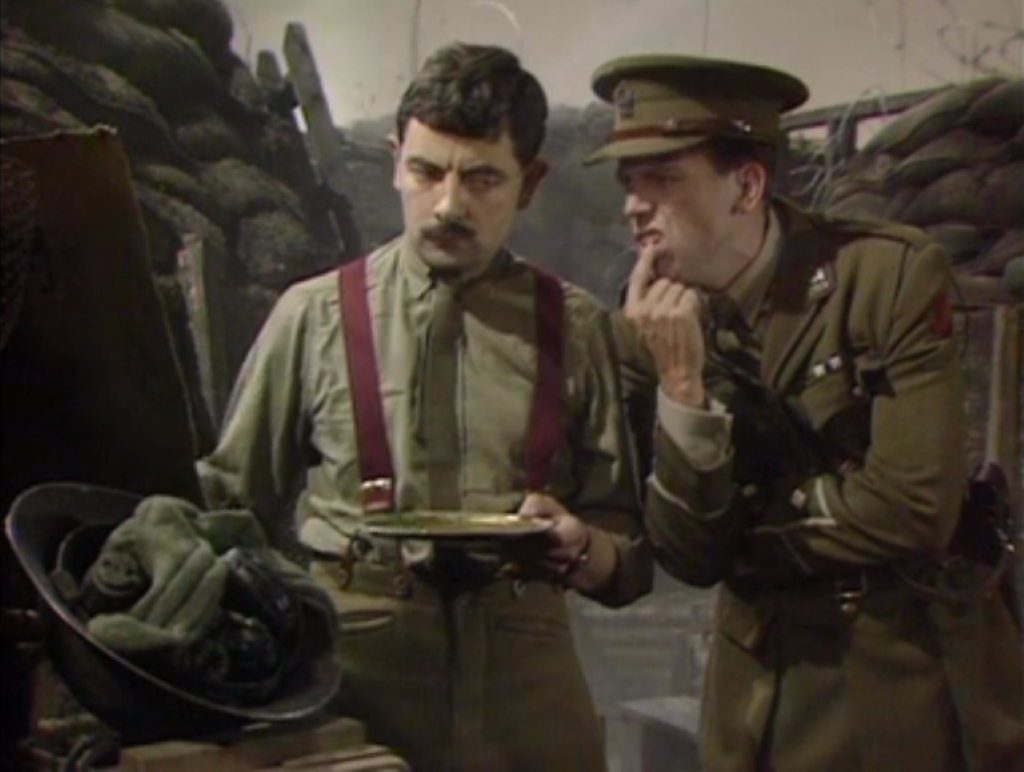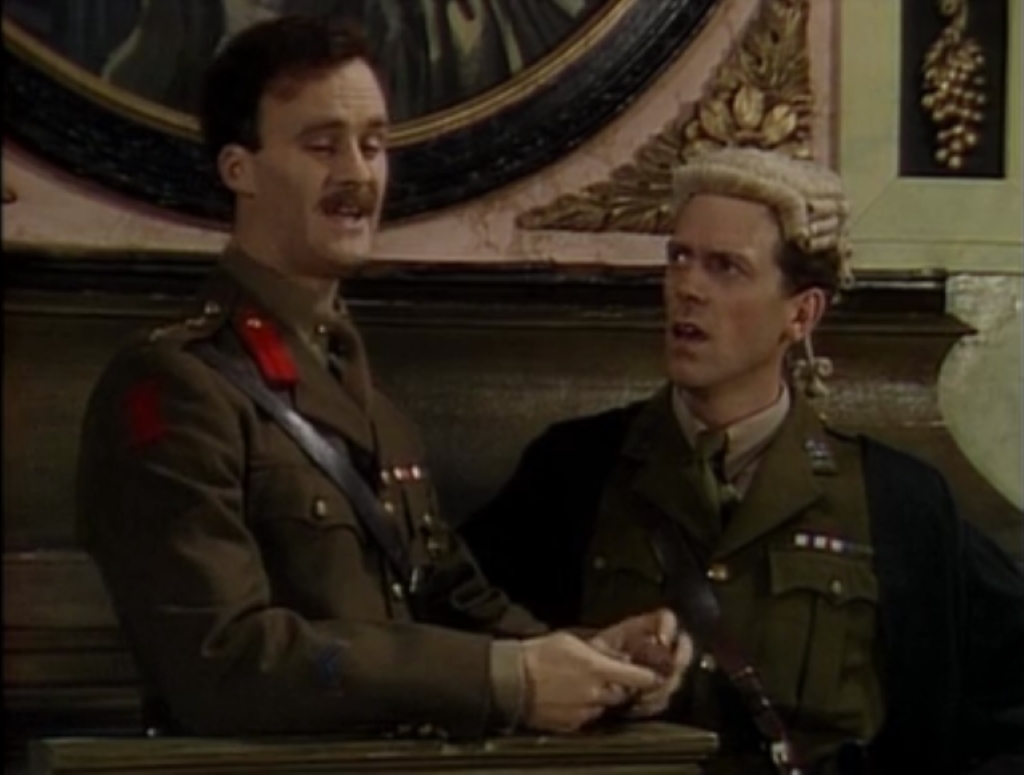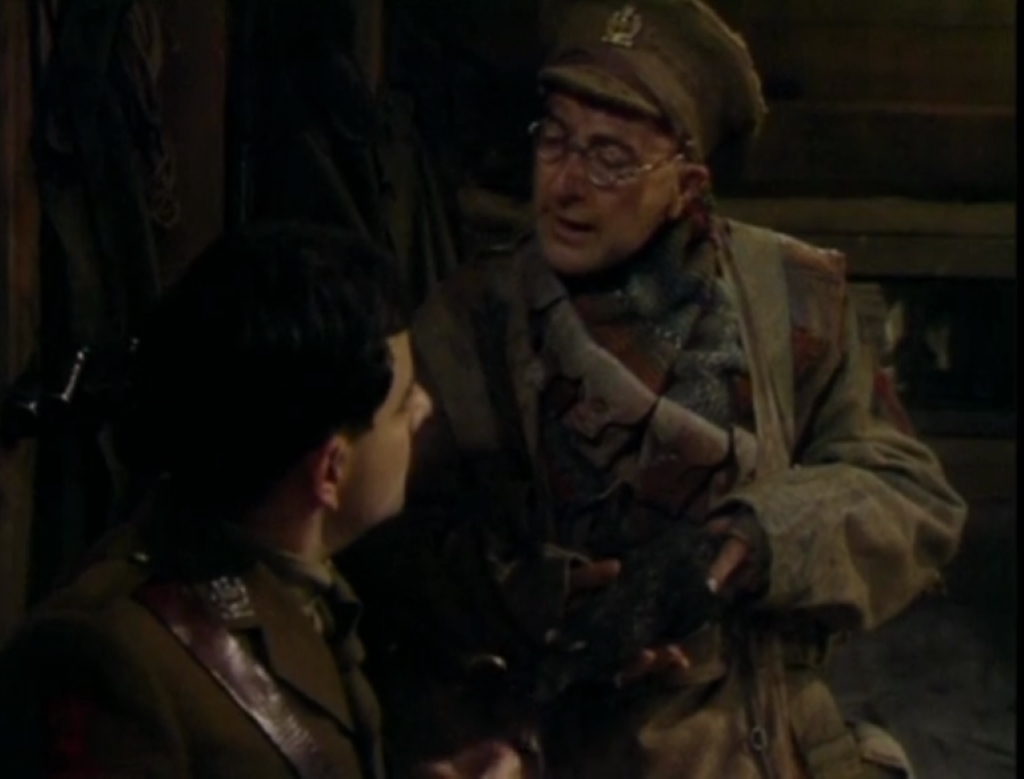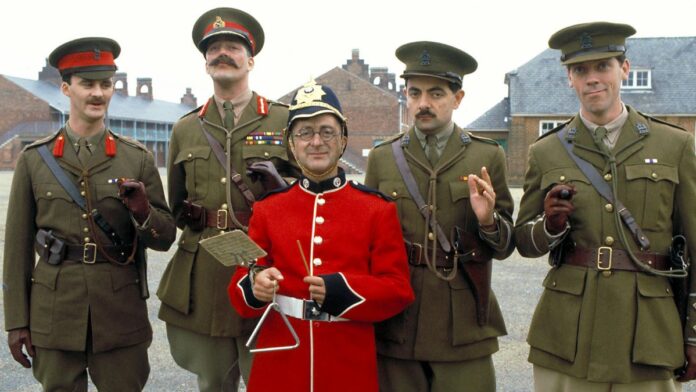Blackadder Goes Forth
Series 4, Episodes 1–3: “Captain Cook,” “Corporal Punishment,” and “Major Star”
Original airdates: Sept. 28, Oct. 5, and Oct. 12, 1989
Sidant: I’ll take the lead as we dive into the final series of Blackadder, but I also want to leave room for all of you to share your thoughts.
Right from the start, Blackadder Goes Forth sets a distinct tone that differs from its predecessors.
It’s hard to think of another series that establishes its tone as clearly as this one.
In the opening scene, we see Baldrick (how impressive that Tony Robinson transforms into a different character each series?) carving his name into a bullet to prevent the Germans from using it.
Baldrick’s action is both humorous and poignant, serving as a reflection of the overall tone of Blackadder Goes Forth – a blend of humor, desperation, and sadness.

In the previous iterations, Edmund experienced ambition thwarted by fools and unfortunate circumstances.
However, in this series, Edmund finds himself in a sane mindset within a chaotic environment, surrounded by eccentric individuals (with the possible exception of Tim McInnerny’s brilliantly sniveling and antagonistic Captain Darling).
His schemes are not driven by a quest for power; instead, they revolve around his desire to escape the madness of World War I and the ever-looming final major offensive.
Whether he’s attempting to secure what seems like a cushy painting job, evading a firing squad after an incident with a pigeon, or putting on an impressive cabaret act, these endeavors represent the desperate measures of a man trapped in the trenches, determined to survive by any means necessary.
Reesav: “Funny, desperate, and sad” indeed aptly characterizes the series, as you mentioned earlier, Sidant.
Previously, the show primarily focused on Edmund’s attempts to profit from the foolish monarchs he served, but now he finds himself under the control of the military chain of command.
His silver tongue is far less effective when trying to circumvent direct orders.
While the show has maintained a satirical and critical tone toward those in power throughout its run, in the first three series, their incompetence was portrayed more as an annoyance.
However, in this series, the consequences are much graver, with 50,000 men losing their lives each week due to the bluster and bloodlust of figures like Melchett and the off-screen General Haig.
All of this sacrifice for gains is as trivial as moving a drinks cabinet six inches closer to Berlin.
This pervasive sense of frustration, of being trapped in a situation beyond one’s control, where the reasons for risking one’s life make no sense – whether it’s for a cause as monumental as war or as trivial as shooting a pigeon – permeates the entire series.
Although Edmund continues his usual behaviors of belittling Baldrick and insulting George, there’s a weariness in the way he delivers his elaborate one-liners, suggesting that his heart isn’t fully in it.
While his companions may be his intellectual inferiors – or, as George humorously puts it, the “stupidest stupids in the whole history of stupidityness” – deep down, they’re all going over the top together, and Edmund seems to grasp this reality.
(Of course, this doesn’t stop him from using his authority to maintain control or manipulate situations, even if it occasionally backfires.)
Now, Blackadder, who possesses the most fashionable brain in London?
Despite the considerably darker atmosphere, the essence of classic Blackadder comedy still prevails.
Alongside Edmund and Baldrick, the ensemble now features the standout qualities from previous series: Hugh Laurie’s absurd optimism and Stephen Fry’s extravagant bluster are permanently integrated, and Tim McInnerny’s welcomed return to the regular cast, after appearing in only one episode of Blackadder The Third due to concerns of typecasting, brings an exciting dynamic.
The reinvention of his character, seemingly aimed at convincing him to rejoin the series, is masterful – after generations of Percys being subjugated by Blackadders, you can practically see the restrained glee on Darling’s face as he thwarts Edmund’s attempts to avoid sacrificing himself for king and country.

Furthermore, there are clever callbacks to earlier series, such as Private “Bob” unexpectedly appearing in the trenches as Melchett’s assistant and Baldrick once again finding amusement in vegetables that have grown into a “rude and amusing shape.”
And, as always, the writing maintains its razor-sharp wit – the gender confusion in “Major Star” alone led to several humorous “PHRASING” moments.
Kriti: I would also like to point out that Forth is more overtly satirical than its predecessors, although this might be attributed to the subject matter.
It’s relatively easy to take jabs at bumbling members of the royal family, as series two and three executed brilliantly, but critiquing military leadership or the very purpose of war itself adds a sharper edge to the social commentary.
These first three episodes clearly illustrate this. Both of you have accurately pinpointed this.
In contrast to the previous two series, which featured plenty of uproarious silliness set against a backdrop of relatively low stakes, even when characters were supposedly “in danger,” the actual risks were minimal.
The plots and schemes served as vehicles for social advancement but also as distractions from the somewhat uneventful surroundings.
However, in Blackadder Goes Forth, this changes.
While humor remains a constant presence, at times sharper than ever, its purpose extends to making more profound statements about inept leadership or reflecting the melancholy you both mentioned.

I find it intriguing that this final series not only reunites all these outstanding performers, which is amazing in itself but also takes Blackadder back to that more critical and darker place we haven’t seen since the first six episodes.
We can all agree that the first series faced quite a few challenges, and I believe those challenges arose from the show’s struggle to blend broad comedy with the specific criticisms it aimed to convey (among other issues, such as mediocre plotting).
The initial run had an odd tension between humor and biting satire that it never quite resolved.
However, in this series, Blackadder manages to pull it off for the most part.
It’s impressive how the show still effectively constructs these situations despite the prevailing desperation felt by the characters.
While the premises still fall within the familiar sitcom framework I’ve discussed before, they are filled with details, both small and large, that reflect the dire circumstances they find themselves in, such as shooting a pigeon for food or attempting to escape to London.
Muskan: You’ve all touched on the distinct undercurrent of fatalism that pervades series four so far, and I’d argue that’s as much a result of the era as it is of the theme.
In 1989, when these episodes originally aired, World War I was barely three generations in the past.
It’s likely that the UK’s population at the time included a fair number of people old enough to have firsthand experience of the Great War’s horrors, whether on the front lines or at home.
Casting a satirical or broadly farcical eye on bygone eras found in history books is one thing; directing your focus toward a national tragedy that still has a direct impact on the present day is quite another.
Reesav, your point about the flicker of a kindred spirit that Edmund recognizes in his addle-pated companions this time around is astute.
Each Blackadder has always exploited his mid-level authority far beyond its nominal scope, mistreating subordinates as if he weren’t a subordinate himself.
However, this time, he’s hindered by the knowledge that no distinction of title, rank, or intelligence truly separates him from the likes of George and Baldrick—their fate will be his sooner or later.
The real power structure is genuinely out of reach this time, much more so than when he was beholden to royalty.
The individual escapades that drive each episode are just as lively and zany as any we’ve seen, but they never conclude with the sense that Blackadder has come out on top, even relatively speaking.
At best, his achievements can only delay the inevitable that awaits in No Man’s Land.
It’s not an overwhelming sense of dread, but it’s sufficient to make you laugh not just out of amusement but also as a way to relieve the tension.
Achieving this delicate balance is a challenging task for a sitcom.
It’s clear why Blackadder would want the franchise’s most accomplished performers on board to achieve this goal.
On a completely unrelated note, I must acknowledge Melchett’s reference to George’s “Uncle Bertie.”
If this isn’t a nod to two other characters brought to life by Fry and Laurie on television, I’ll be genuinely surprised.
Reesav: And there’s even a reference to Boat-Race Night!
George appears to be the kind of person who would readily appropriate a policeman’s hat, regardless of whether or not a policeman is wearing it.
You Might Like To Read: Review: Prime Suspect, Series 1, Part 2


